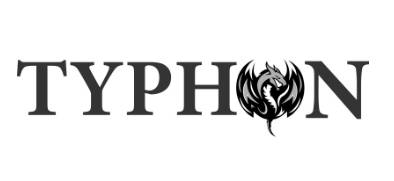
4000lbs Trench Digger with Boom Swing, Canopy, Retractable Tracks
TYPHON TERROR XIX STORM Mini Excavator
$13999 | Shop nowNew
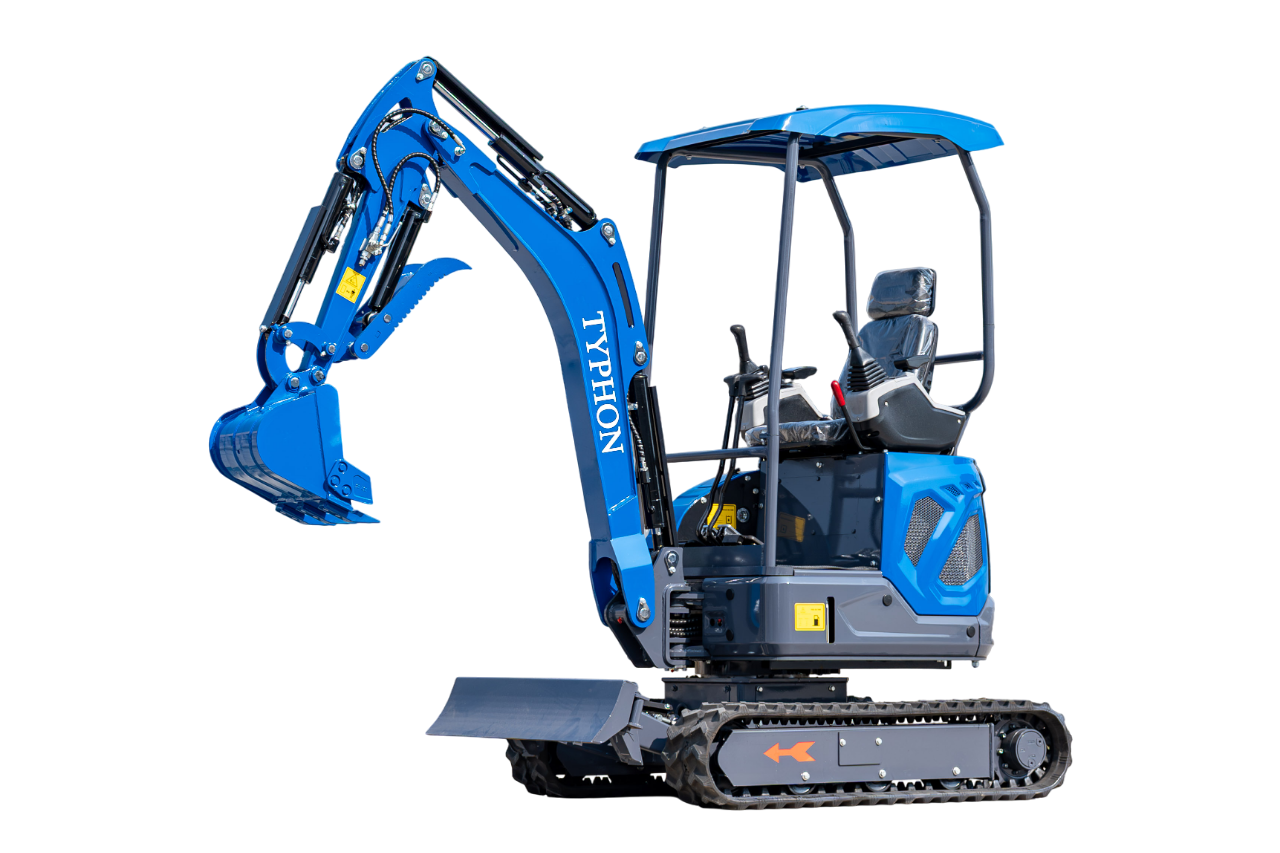
TYPHON TERROR XIX STORM Mini Excavator
$13999
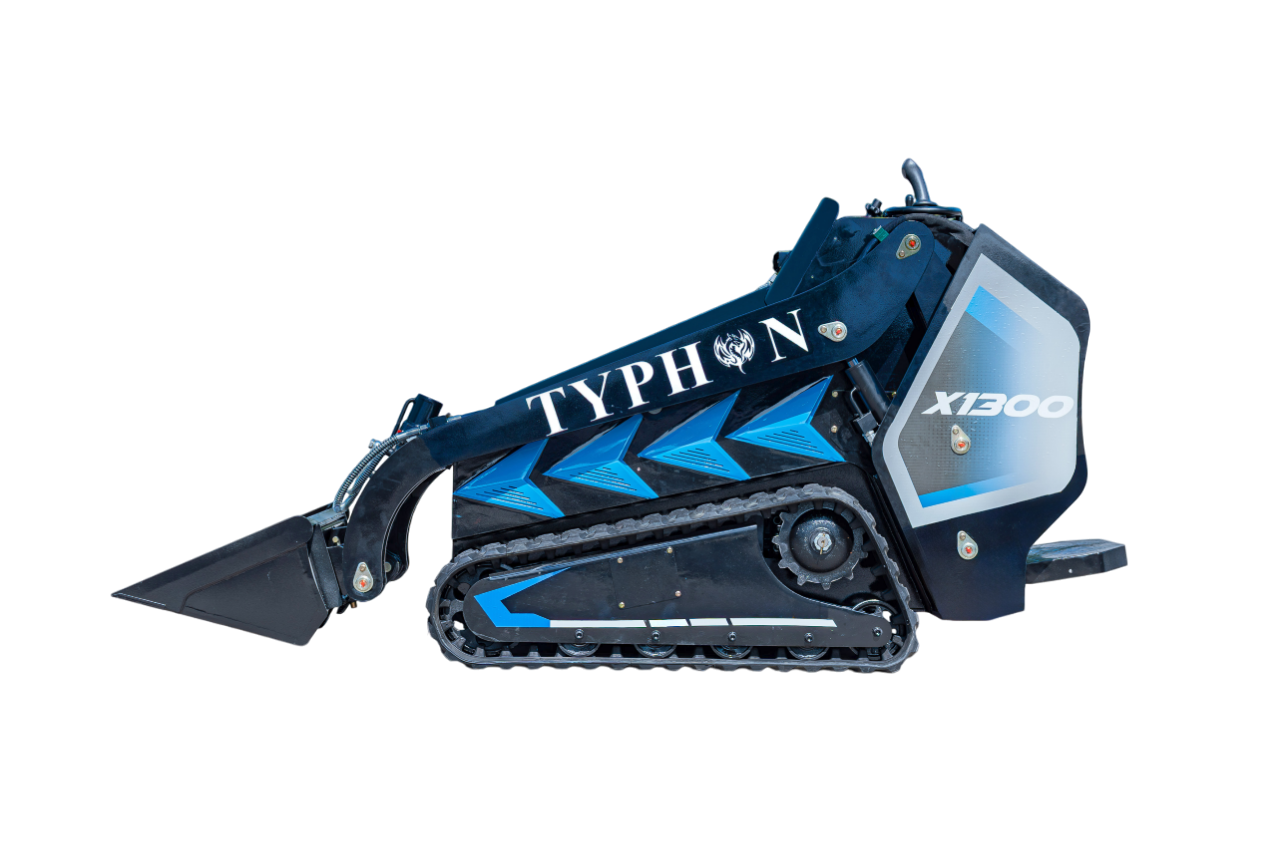
TYPHON STOMP X1300 25HP Mini Skid Steer Loader
$14999
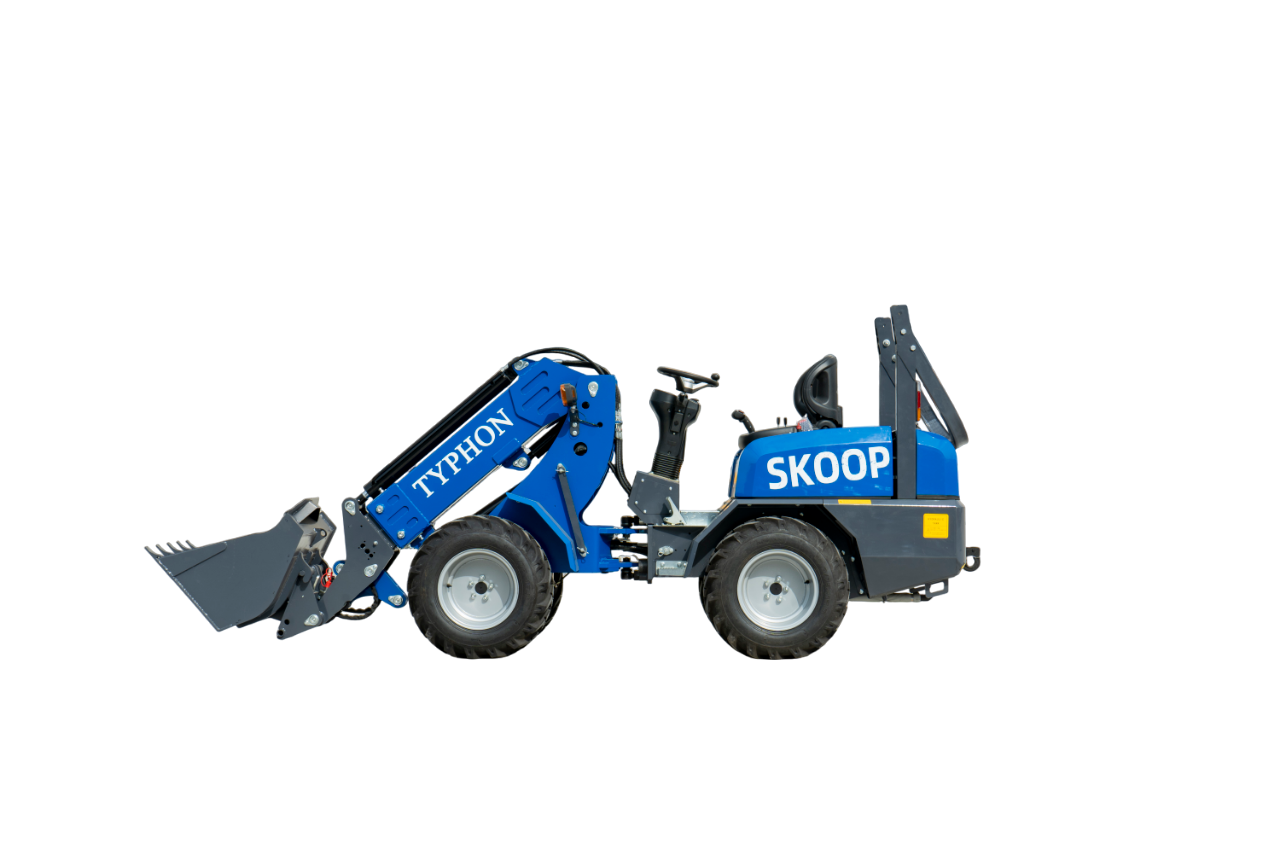
TYPHON SKOOP Wheel Loader Kubota D1105
$16999

TYPHON
STOMP X1300
25HP, Kubota D1105 engine
Brand New TYPHON STOMP X1300 25HP Kubota Diesel Mini Skid Steer Loader
$14,999 | Shop nowSale

TYPHON SKOOP Wheel Loader
New TYPHON Wheel Loader with Kubota D1105 engine 24 hp 1 ton Load USA
$16999 | Shop nowPopular

4000lbs Trench Digger with Boom Swing, Canopy, Retractable Tracks
TYPHON TERROR XIX STORM Mini Excavator
$13999 | Shop nowNew

TYPHON TERROR XIX STORM Mini Excavator
$13999

TYPHON STOMP X1300 25HP Mini Skid Steer Loader
$14999

TYPHON SKOOP Wheel Loader Kubota D1105
$16999

TYPHON
STOMP X1300
25HP, Kubota D1105 engine
Brand New TYPHON STOMP X1300 25HP Kubota Diesel Mini Skid Steer Loader
$14,999 | Shop nowSale

TYPHON SKOOP Wheel Loader
New TYPHON Wheel Loader with Kubota D1105 engine 24 hp 1 ton Load USA
$16999 | Shop nowPopular
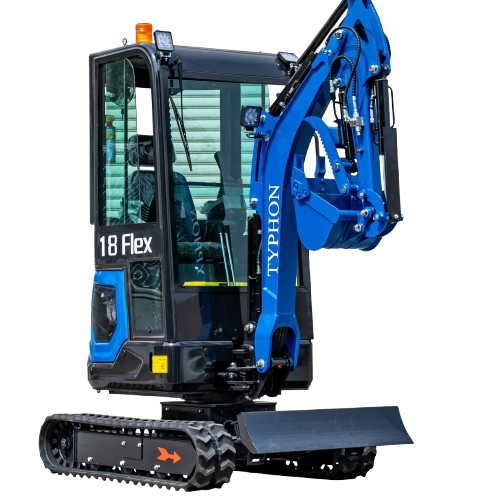
EXCAVATORS
Compact and powerful mini excavators built for digging, trenching, and landscaping with precision, efficiency, and easy maneuverability on any job site.
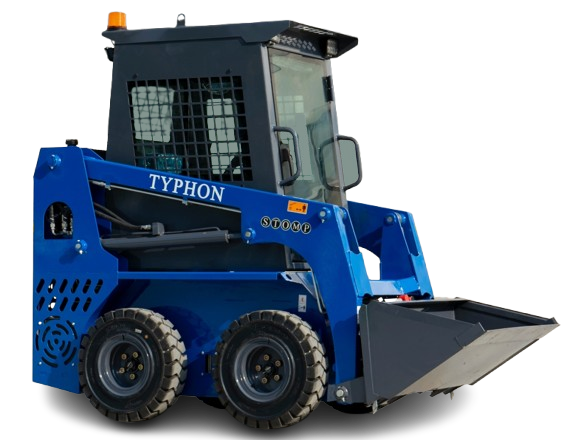
SKID STEERS
Compact yet powerful, TYPHON mini skid steers provide excellent lifting, smooth control, and multi-attachment versatility for all worksite needs.

FORKLIFTS
TYPHON Machinery forklifts are engineered to deliver maximum durability and cost-effective performance.
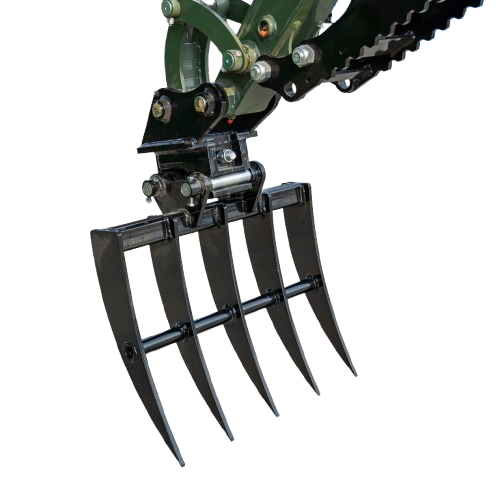
ATTACHMENTS
TYPHON attachments enhance machinery versatility, offering durable, high-performance tools for digging, lifting, grading, and specialized construction tasks.
Typhon Machinery
Find Your Next Mini Excavator for Sale at Typhon Machinery
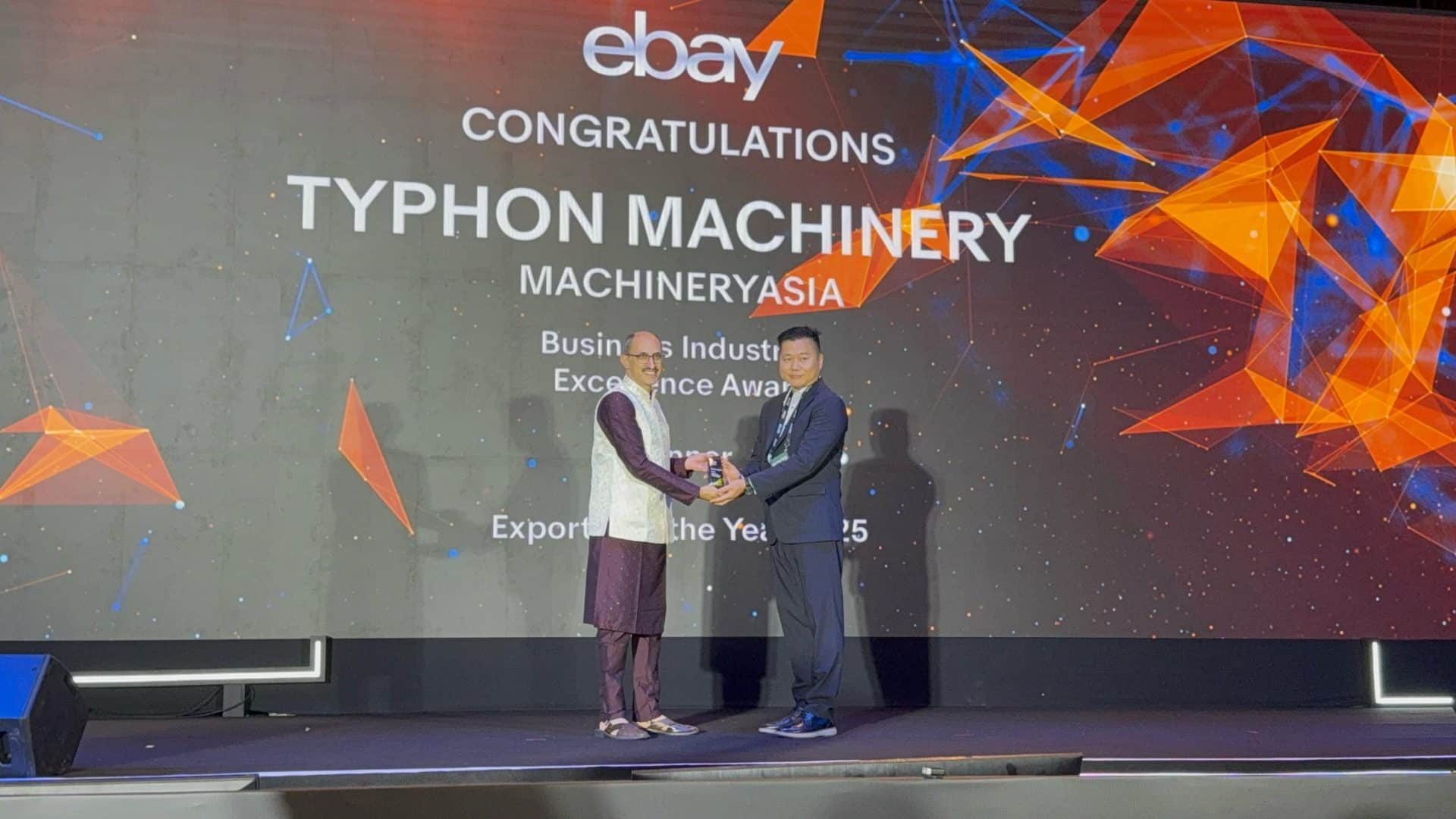
TYPHON Machinery Named eBay Exporter of the Year 2025
TYPHON Machinery, a global manufacturer and exporter of compact construction and material-handling equipment, has been named Exporter of the Year 2025 in the Business & Industrials category by eBay.com,
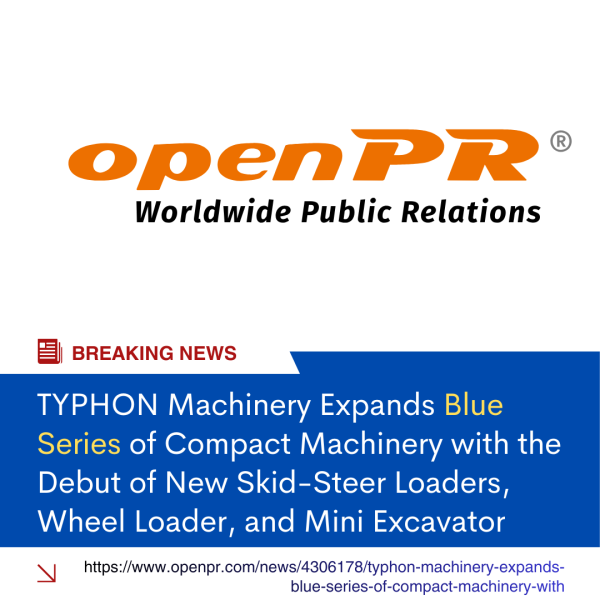
TYPHON Machinery Expands Blue Series
TYPHON Machinery, the company that is dedicated to providing premium mini excavators that redefine dependability, performance, and durability, today announced the expansion of its Blue Series.

TERROR XVIII Mini Excavator Tops eBay U.S. Sales
TYPHON Machinery, a global manufacturer and exporter of compact construction and material-handling equipment, has been named Exporter of the Year 2025 in the Business & Industrials category by eBay.com,
Features That Move the Earth
Robust Hydraulic Systems
Every Typhon machine is equipped with high-performance pumps and valves, ensuring consistent breakout force even in tough clay or rocky soil.
Built to Last
Attachment Ready
Just Landed! Explore Our Latest Stock
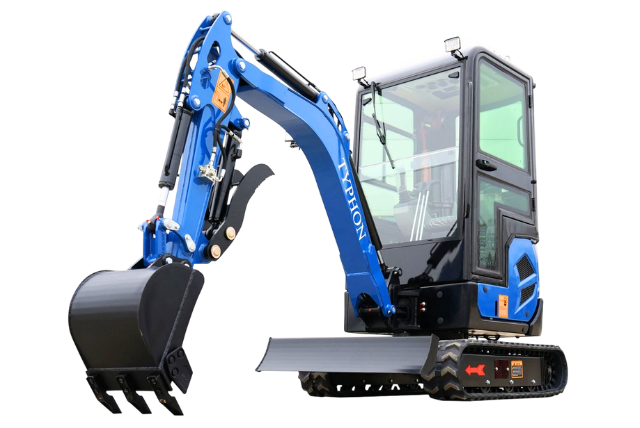
2025 TYPHON TERROR XVII Cabin Mini Excavator
- 4,000 lbs
- Kubota D902 engine
- Blue Series
$12999
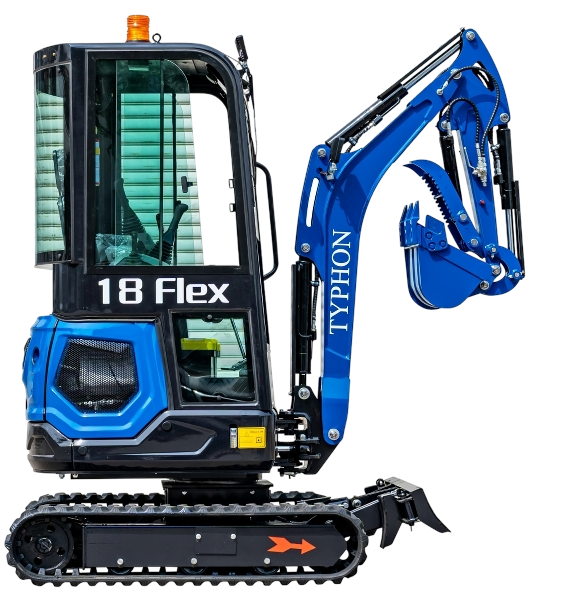
TYPHON 18 FLEX PRO 1.8 Ton Mini Excavator
- 1.8 Ton
- with 12 attachments
- Kubota D722 engine
$14999
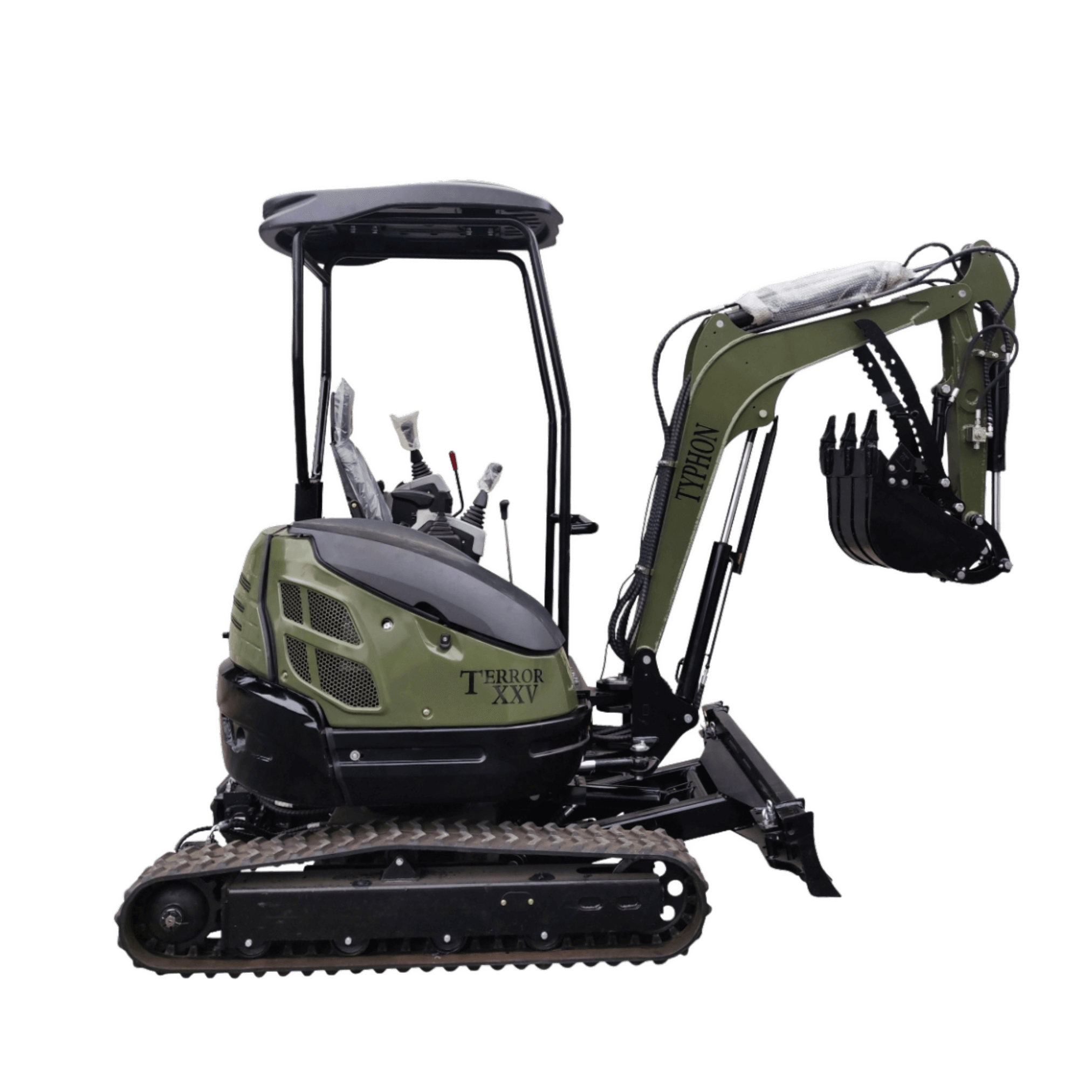
TYPHON TERROR XXV 2.5 Ton Mini Excavator ( GREEN)
- 5500 lbs
- 25.1HP
- Kubota D1105 Engine
$19,999
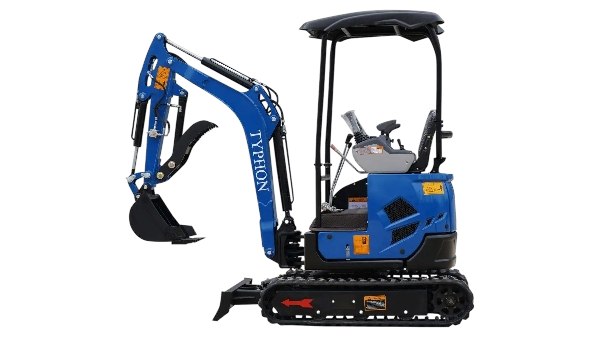
TYPHON TERROR XVII Mini Excavator Rubber Track
- 3800 lb
- 500mm wide bucket
- Kubota D902 engine,
$10999
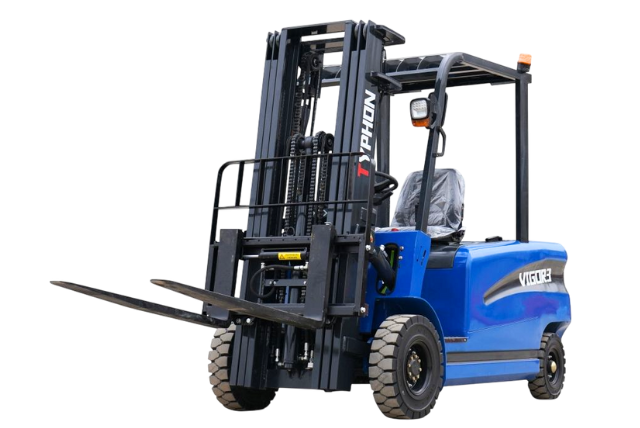
2025 TYPHON VIGOR 3.0 Blue Electric Forklift
- 3 Ton Lifter Lift Truck
- 6,600 lbs
- 60V/250 Ah lead-acid battery
$12999
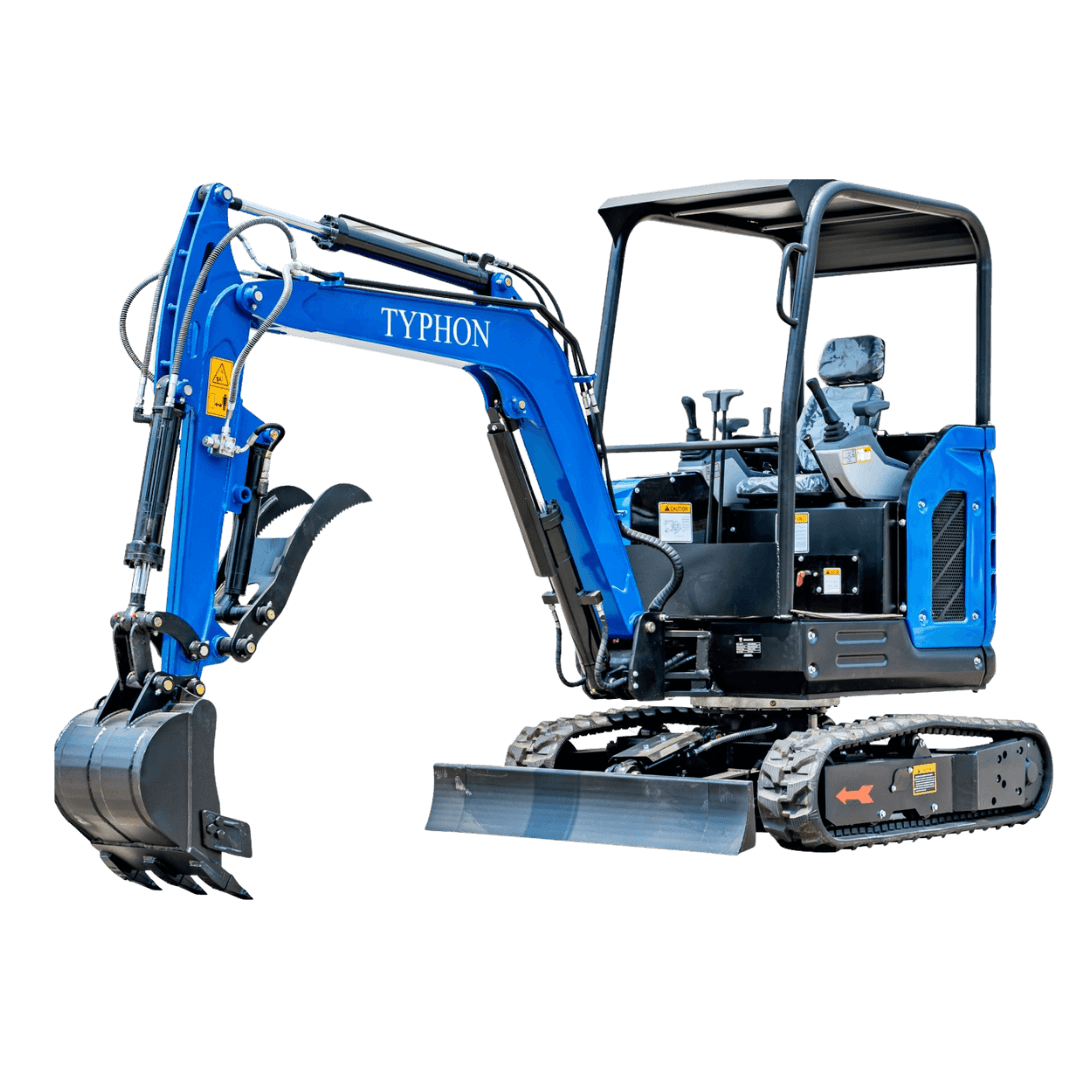
TYPHON TERROR X2 STORM Mini Excavator 2.5 Ton Diesel Kubota V1505 Engine
- 25 HP
- 5500lbs
- Kubota V1505 engine
$20000
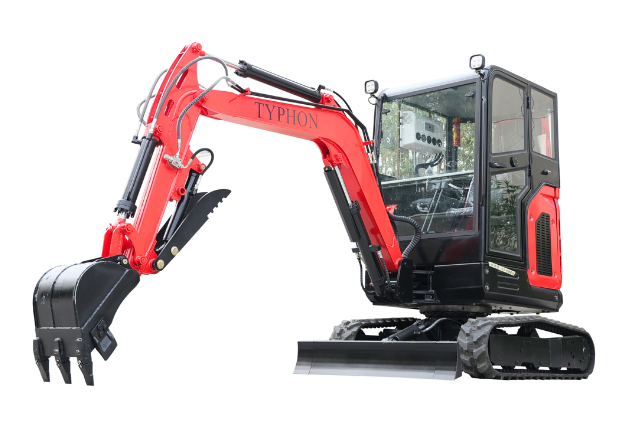
TYPHON TERROR X2 Mini Excavator
- 2.7 Ton
- 500mm wide bucket
- EPA Diesel Perkins Engine
$26398
Heavy-Duty Performance Meets Compact Precision.
Are you searching for a reliable mini excavator for sale that doesn’t break the bank? At Typhon Machinery, we specialize in high-performance compact excavators designed to tackle the toughest jobsites. From backyard landscaping to professional utility trenching, our range of mini diggers offers the perfect balance of power, agility, and value.
Why Typhon Machinery is the Best Place to Find a Mini Excavator for Sale
When you invest in a mini excavator for sale, you need a machine that works as hard as you do. Typhon Machinery bridges the gap between expensive “big name” brands and low-quality alternatives. We provide professional-grade small excavators that are engineered for the American jobsite.
- Unmatched Value: Get the hydraulic power and digging depth of a premium machine at a fraction of the cost.
- USA-Based Support: Headquartered in Commerce, CA, we provide local technical support, parts, and service.
- Ready-to-Work Attachments: Every mini excavator for sale in our inventory is compatible with a wide range of attachments, including augers, thumbs, and hammers.
- Certified Power: We use world-class engines like Kubota, Briggs & Stratton, and Honda to ensure your mini digger starts every time.
Explore Our Mini Excavator Inventory
1. The Typhon Terror Series (1.0 - 1.3 Ton)
The Typhon Terror XI and Terror XIII are our most popular options for those looking for a small mini excavator for sale. Perfect for garden work, farm maintenance, and tight-access residential projects.
- Engine: 13.5 hp B&S or Honda.
- Key Feature: Compact width for passing through standard gates.
2. The Typhon Flex & XVIII Series (1.8 - 2.0 Ton)
If you need more breakout force, the Typhon 18 Flex is a powerhouse compact excavator. It is widely regarded as the best mini excavator for sale for utility contractors and professional landscapers.
- Engine: Kubota Diesel.
- Key Feature: Retractable tracks and boom swing for precision digging.
3. The Typhon LXV & Naga (3.5 - 6.6 Ton)
For commercial site prep and heavy excavation, our larger models provide the reach and lifting capacity required for serious construction work.
Maximized Digging Depth: Engineered with extended reach capabilities to handle deep trenching and large-scale foundation projects with ease.
Key Applications for Your New Mini Digger
Our customers buy a mini excavator for sale for a diverse range of tasks. Because of their versatile hydraulic systems, Typhon machines excel in:
- Trenching & Utility Work: Ideal for laying pipe, cable, or fiber optics.
- Landscaping & Grading: Perfect for clearing brush, removing stumps, and leveling terrain.
- Small-Scale Demolition: Use a hydraulic breaker attachment to tear down sheds or concrete pads.
- Agricultural Tasks: A must-have for farm owners managing drainage or fence post installation.
The Typhon Machinery Advantage: Quality You Can Trust
Searching for a mini excavator for sale online can be daunting. We simplify the process with transparency and elite service.
Standard 1-Year Warranty
Every mini excavator for sale comes with a 1-year warranty. We provide free spare parts during the warranty period to ensure your machine stays operational.
Full Hydraulic Control
Unlike many budget options, Typhon machines feature smooth, pilot-operated joystick controls. This ensures that when you operate your compact excavator, you have total precision over every movement.
USA Parts Warehouse
Don’t wait weeks for a part to ship from overseas. We maintain an extensive inventory of replacement parts in our California warehouse, ensuring that your mini excavator for sale remains a productive asset for years to come.

For residential use, we recommend the Typhon Terror XI. It’s lightweight, easy to transport on a standard trailer, and simple to maintain.
Our machines are designed with “easy-access” panels. Daily checks of hydraulic fluid, engine oil, and greasing the pivot points will keep your small excavator running smoothly.
Yes! We offer fast, secure shipping across the United States. Your mini excavator for sale will arrive ready to work, often within days of your order.
EXCELLENTVerified Very happy with the service. Excavator arrived weeks earlier than expected. Checked all bolts on machine only found one bolt on the floor plate loose, changed oils. Everything on the excavator works properly.Posted onVerified The machine seems to be good, The forward controls are questionable. It has a joystick control, that operates in the opposite direction, if you guide the joystick to the right, the machine goes left. If you guide the joystick to the left the machine goes right. The machine operates fine in reverse. I contacted Machinery Asia and their response was this" How it was designed". Really?? I am concerned with how they address problems and wondering about continued investment in their productsPosted onVerified Very smooth transaction. Build date on the motor was 10/25. Then shipped to Typhon plant to be installed on excavator. While MachineryAsia apologized for having me 'wait' till Thanksgiving! Unbelievable! Delivery was smooth as silk from other coast. She had plenty of fuel, even the grease fittings were full. This is why MachineryAsia and Typhon have their excellent reputation.Posted onVerified Good communication and item arrived as describedPosted onVerified That looks great I haven't had a chance to put it on yet to see if it works right or not but we'll give them further update as I goPosted onVerified Have not used it very much yet so we will see how it lasts. Seems to be very good quality. It had everything I wanted on an excavator. Hydraulic fluid cooler. Fan. Side swing boom. And hydraulic thumb. All for the same price as other excavators without any of those extras. It would have cost me a lot of time and money to add all those things. The delivery guy was great. He drove it off the truck right into my driveway. Great transaction. Thank you.Posted onVerified Purchase and delivery were very quick, less than 2 weeks. Excavator came with a damaged display screen. Notified supplier. Received a replacement screen in less than 2 weeks. Easy change out. Works perfectly. Very happy with purchase. Excellent. Runs well. Caught it with a price drop. Appears to be well built.Posted onVerified Only starting to play with the machine, and so far is better built than I was expecting.....delivery method was a joke.Posted onVerified Suprisingly easy shipping. The mini excavtor came when and how I expected. Works great, too :)Posted onVerified This is a nice piece of equipment for the price shipping was great have tried to contact seller for attachments for this I shall still try and reach out would like to get an grappling device for it
